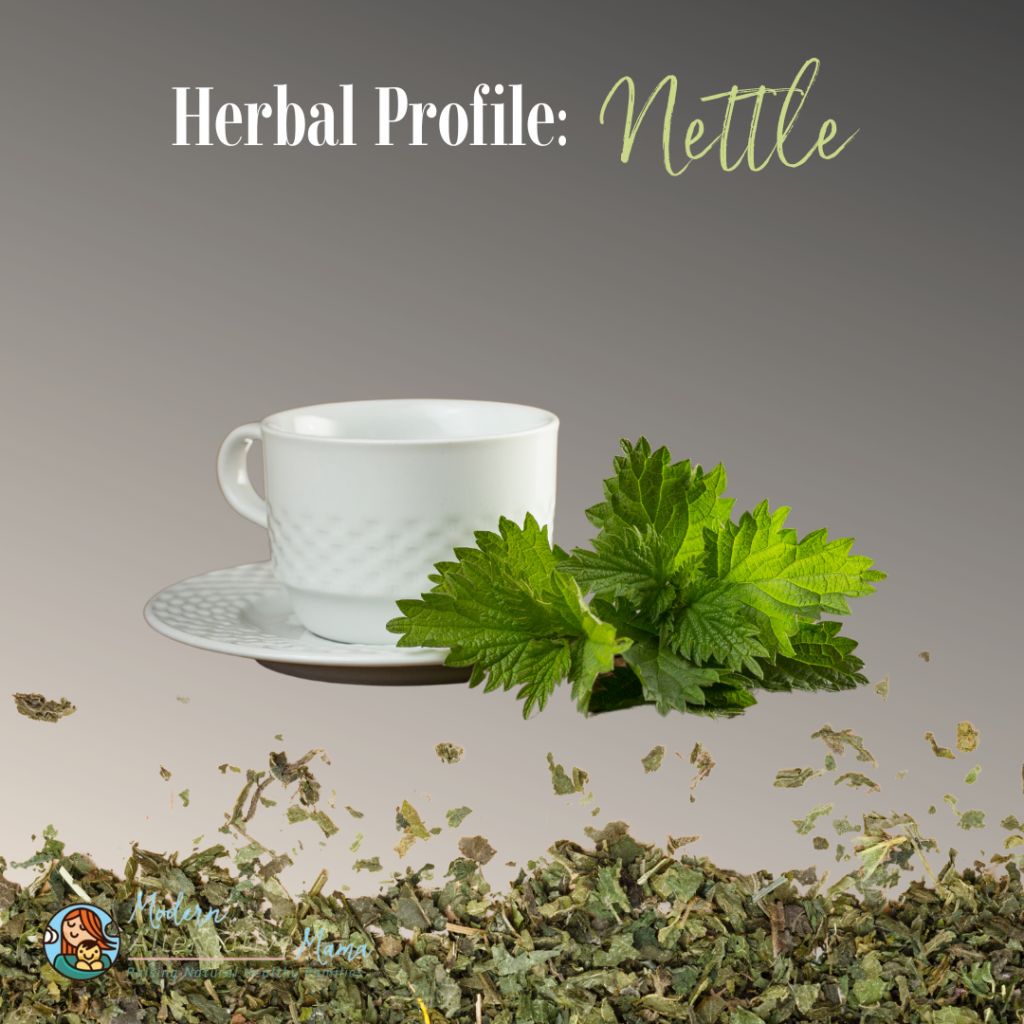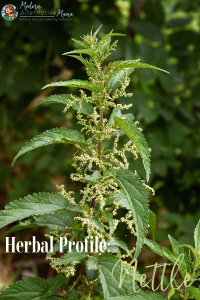What is Nettle?
Nettle, sometimes referred to as stinging nettle, common nettle, or by its botanical name Urtica dioica has been a staple in herbal medicine dating back to ancient times in Egypt and Greece (1). Nettle can be identified by its pointed, coarsely toothed leaves that can be several inches long. The overall plant grows 2 to 5 feet tall and has become naturalized throughout the United States (2).
Health Benefits of Nettle
This herb can be supplemented in a pill or tincture, dried, freeze-dried, or even cooked to be safely consumed and has several potential health benefits, including:
May Boost Blood Antioxidant Levels
Nettle is packed with potent antioxidants, which help neutralize or prevent the harmful effects of free radicals in the body. The buildup of free radicals has been linked to chronic diseases, such as cancer and heart disease (3). One study indicated that Urtica dioica might affect lipid peroxidation and some antioxidant enzyme activities (4).
May Reduce Inflammation
Inflammation is the body’s way of healing and fighting off infections, but chronic inflammation can also cause serious problems (5). Thankfully, nettle possesses an array of compounds that may reduce inflammation, according to several studies. In one animal study, results suggest that a portion of the anti-inflammatory effect of Urtica extract may be attributed to its inhibitory effect on NF-kappaB activation (part of the immune system responsible for inflammation development) (6). Nettle also reduced levels of numerous inflammatory hormones by interfering with their production in vitro (7). I recommend Earthley’s Nourish Me Naturally for these benefits.
May Lower Blood Pressure
High blood pressure increases your risk for heart disease and stroke, the two leading causes of death here in America. Unfortunately, tens of thousands of Americans have uncontrolled high blood pressure here in America (8). Thankfully, Urtica Dioica has an antihypertensive effect and a channel blocking effect that can help manage hypertension (9). In animal studies, nettle has effectively lowered blood pressure levels (10).
May Help Control Blood Sugar Levels
The plant compounds of Urtica Dioica may mimic the effects of insulin (11), an important hormone secreted by the pancreas that controls many things throughout the body but is primarily implicated in managing blood sugar levels (12). One human study found that patients with advanced type 2 diabetes had improved glycemic control when taking Urtica Dioica leaf extract compared to the placebo group (13). Another study found that supplementing Urtica Dioica aided diabetes and may decrease risk factors of cardiovascular incidence and other complications in patients with diabetes mellitus (14).
May Support Wound Healing
Nettle may also help support wound healing; this includes burns. According to one study, Urtica Dioica had a presence of unsaturated fatty acids and high concentrations of lupeol, which proves the effectiveness of Urtica Dioica and wound healing (15). Another study on rats with second-degree burns found that nettle had maximal recovery rates compared to silver sulfadiazine and vaseline (16).
May Reduce Bleeding
It has been said that medicines containing nettle have been found to reduce excessive bleeding, especially after surgery. One study tested this theory using an ankaferd blood stopped (ABS), a mixture of Thymus Vulgaris, Glycyrrhiza Glabra, Vitis Vinifera, and Alpinia Officinarum, and Urtica Dioica. This study concluded that ABS lessened bleeding compared to an isotonic saline solution (17).
In another study using ABS, ABS demonstrated outstanding potential for being an effective hemostatic agent for excessive bleeding after dental surgery in patients with hemorrhagic diathesis (18). I recommend Earthley’s Ease the Ache for these benefits, especially during menstruation or postpartum.
May Help Hay Fever/Allergy Symptoms
Hay fever, also known as allergic rhinitis, is caused by an allergic response that causes inflammation to the lining of your nose. This response occurs due to outdoor or indoor allergens such as pollen, dust, or animals. It is often associated with a runny nose, itchy eyes, congestion, sneezing, and sinus pressure (19). Research has shown some promising results as a natural treatment.
One test-tube study found that nettle extract can inhibit inflammation that triggers these seasonal allergies as nettle blocks the histamine receptors and stops immune cells that release these chemicals that can trigger allergy symptoms (20). I recommend Earthley’s Sinus Saver for these benefits.
Safety Concerns
Trusted herbalist, Richard Whelan, states no adverse reactions are expected with nettle. Nettle may safely be used during pregnancy or breastfeeding (where they may be expected to encourage healthy milk production). You have to be very careful handling fresh Nettles, but once dried or taken as a tincture, they are incredibly safe to use, even in high or frequent doses (21).
How to Use Nettle
You can find nettle in dried bulk, teas, extracts, oils, or tinctures. Tinctures always contain the most concentrated amount of herbs. Teas and soups are also options, especially when following ayurvedic medicine recipes. If you’re a DIY person, some great starter recipes are:
Follow the recommendations of any supplement; some of my recommendations include:
Earthley’s Calm and Clarity helps promote a calm mood and mental clarity. Those who could use a little help cutting through the brain fog and focusing on a task may benefit from this herbal extract.
Earthley’s Ease the Ache uses the natural power of herbs to help relieve unbalanced hormones, pain, bloating, heavy bleeding, and more. Cramp bark, red raspberry leaf, motherwort, and nettle combine to create the best natural remedy for periods and postpartum afterpains.
Earthley’s Energy Plus {Herbal Iron} is made with herbs rich in iron and vitamin C to increase energy naturally. This tincture supports a natural energy boost, endurance throughout the day, and restful sleep at night. Unlike synthetic vitamins, our herbal iron provides natural energy from the earth in amounts your body can adequately absorb.
Earthley’s Nourish Her Naturally is an herbal multivitamin made to fortify, improve, and nurture the female body. This tincture includes herbs packed with vitamins and minerals to help balance hormones, boost energy levels, and promote overall wellness. Herbal multivitamins use the power of nature rather than isolated mega-doses, which can create imbalances in the body.
Earthley’s Nourish Him Naturally is an herbal multivitamin curated with a man’s specific needs in mind! This product uses herbs to support heart health, prostate health, and energy levels to make this vitamin powerhouse. You could see an improvement in overall health and wellness through this natural and organic herbal supplement!
Earthley’s Nourish Me Naturally herbal multivitamin for everyone is the organic way to help your body get the nutrients it needs. Formulated to provide your body with safe and adequate levels of vitamins and minerals it can adequately absorb, made from actual, whole herbs; not isolates or synthetics.
Earthley’s Sinus Saver is an herbal tincture that provides natural support during allergy season and beyond! Enjoy relief from sneezes, sniffles, sinus pressure, watery eyes, and other annoying allergy symptoms. Sinus Saver uses the power of herbs to help clear the body of excess histamines and calm allergic reactions.
Disclaimer: This post is not intended as medical advice. These statements have not been evaluated by the FDA, and nothing in this post is intended to diagnose, treat, or cure anything. If you have questions, please do your own research or seek advice from a health professional.







